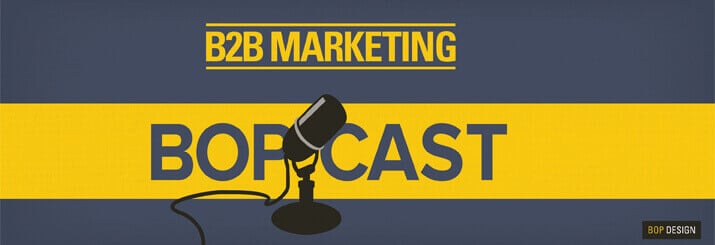Bop Design: Good afternoon, everybody. Welcome to the ‘B2B Marketing Bopcast’. Today, I have with me Diane Gilabert, CPA based here in Sunny San Diego. We’re going to talk about how Diane has grown her business as just one person through very creative marketing strategies that I think are still little unheard of in the accounting and finance world. If you are working in those industries and have been nervous to tackle tactics such as logging and social media, hopefully, Diane’s words and her experiences have provided that. Could you talk to me a little bit about how you were getting clients at that time?
Diane Gilabert: You bet. Thank you.
BD: Let’s dive into when you first came to Bop Design and what the state of your business is at.
DG: Sure. I was a partner in one of the big four accounting firms, a tax partner. I had some credibility, but my initial clients were coming all from word of mouth, so other colleagues that I had worked with while I was at the big firm or colleagues that I had worked with and had left to form their own firms because my practice is business to business, so my clients are other CPA firms.
It worked great for a while. I got some really good initial core clients, but yes, then it stalled and I wasn’t as busy as I wanted to be. I actually had done a website myself in a completely different field, so I know how much work it was. I said, “You know what? Do I really want to go through all of that on my own, or do I want to hire a professional?”, because I knew I wanted to do some blogging and I just had no idea how to put all of that together and really not the interest to figure it out on my own.
BD: It seems like you had some background knowledge of the website process and the work that it goes into it. What was the greatest value for you when you came out of the whole process with Bop Design?
DG: Seriously, the biggest benefit was that you made it easy, so I didn’t have to worry about updating. I mean, you taught me how to do that if I did want to change some of the webpages. You were very patient in showing me, “All right. This is how you tweak the verbiage.”
For the most part, I had everything I needed, and the only thing I was really going to update was the blog on a periodic basis, and the blogging’s offer that was bolted on to the website was very integrated. It all looked extremely professional. Because my clients or other businesses and other professionals, I didn’t want something to look cheesy, and it didn’t at all. It looked really good, really slick, and it was really easy for me to blog and to update the blog.
BD: With the ease of updating and that ties in nicely with your decision to blog, you came to Bop Design with the idea that you eventually wanted to take on blogging. How have you gotten your inspiration along the way to continue it?
DG: It actually comes out of my consulting practice, because what I do is I filled questions from other CPAs that they have difficulty with or difficult client situations. I started to hear some similar things from more than one client, and I said, “Wow. If there’s a couple of clients asking these same questions, I bet there’s a broader interest for that topic.” Really, it’s not difficult to figure things out to blog about. It’s more actually putting pen to paper and really making myself do it, but there are tons of topics.
I would even get suggestions from some of the people that followed my blog. “Oh, I wish you would do a blog post on this because I had that issue last week, and I wasn’t sure what to do,” so it came from really my practice itself.
BD: Have you found with blogging and the website in general that you’re getting leads that aren’t just word of mouth or aren’t referral partners? Have you found people who are in need of your consulting services that you wouldn’t have naturally found them just through networking or through your past jobs?
DG: Yes. That’s been I got to admit a huge surprise. Doing the blog had a couple of purposes, for one, to establish my credibility. If I had a new client, prospective client, the first thing I’m sure they did after they got my business card or met me or whatever, heard about me is they Googled me. It was great.
The website comes up, there’s an ‘About Me’ page, they can read about my background, and then they can go to the blog and establish as my credentials as somebody who knows what I’m talking about, and also helps them to understand what the issues are that I’m good at. That way, I’m not getting clients that are not in my space or area of expertise. That was good and that was what I was really [wanted as] my primary objective.
What it’s turned into amazingly is as I started to build content and I started to move up the chain I guess on Google, when colleagues would Google a particular technical area in tax, oftentimes, my blog post would come up. I started getting increase just through email or even somebody just picking up the phone and saying, “I read your blog post on this, and I have a question in that area,” and not always does it turn into a client, because I’m more than happy to help people if it’s a quick question, a one-off question about something or just something they wanted to get check on, but it has.
The first client I got was great because I did a really narrowly focused blog post on the kind of what I thought was an esoteric issue. No joke, the next, a firm in Santa Monica Googled that three keywords, my blog post came up first, they called me, and they’ve been now a client for the last two years a pretty good client.
BD: That’s fantastic to hear, and I think that echoes a lot of what we hear from our client’s concerns in two different areas, one is “How granular does my content need to be?” A lot of people think that they need to be targeting for these very general keywords such as ‘Accounting’ or ‘CPA’. Really, it’s not about that because so few people are searching for such broad of a situation nowadays. They’re searching more for a very granular need, and they’re much more likely to engage somebody and hire them if they consult that very specific needs. I think that’s a perfect example.
Then, another concern that I think we’ve run into with some clients with blogging or just content marketing in general, it’s the concern of giving away a portion of your business for free, so giving away a tip or a piece of advice if somebody were to call or just post a comment. What do you say to people who are concerned of, “What if my competitors are listening to me?” or “Am I giving away too much?”
DG: I think there’s two things, there’s two answers to that. One, there’s plenty of work for what I do. There’s plenty of need for what I do, so in that way, I’m fortunate. There’s not a lot of people that have my exact business model, and there’s a lot of local CPAs, smaller CPA firms out there looking for an expert in a particular area. In that sense, I’m fortunate.
I think, the other thing is people are looking for information. They’re looking for whatever it is that you do, and it really helps establish your credibility if you can show them your area of expertise that you really do know what you’re talking about. I’ve never actually had an issue with being concerned about competition. I mean, maybe people are taking some of my blog post and making their own blog post out of it, or putting it in their newsletter.
I mean, I’m fine with that. None of my content is proprietary to any extent. It’s all, “This is what the tax law says, and here’s a typical situation, and here’s how you apply it”, and I think we all need to help each other, us being the profession itself because it’s hard. I’m more than happy to help people. I think that comes across as a genuine aspect of me as a person, and that helps establish trust with people that don’t even know me.
BD: That’s a very important point with establishing trust and credibility especially in a business environment where they’re hiring you for your consulting expertise and they’re hiring you for very sensitive situations. They need to have trust instilled in you that you’re going to be able to accomplish what you’re being hired to do.
Going from blogging which you’ve been very successful in and been able to get a lot of thought leadership out there it seems, for social media which you’re also very active on Twitter which is growing in popularity I would think among the accounting space, but it’s certainly not a very busy industry topic in comparison to something like a health and fitness industry where there’s a ton of Twitter accounts on something like health and wellness. When you started Twitter, was this before your website or after or during?
DG: It was before. Actually, the website I referred to that I did on my own in a different space, it wasn’t health and wellness, and so my initial Twitter followers were as a result of that website. I got addicted to Twitter. I love Twitter. I think it’s so much fun. I learned so much current information, just about random things from being active on Twitter.
When I thought about, “How am I going to get my blog post out there?” I mean, obviously, there’s always organic search through Google, and you hope that people are searching for your keywords, but what are other ways to do it? Twitter is a natural. It’s a great way to get your blog post out there.
It’s not difficult. It’s really easy. There’s all these services that are free that you link to your blog post, and you just put in a hash tag with a keyword like ‘Tax’, and so then, all of my colleagues that are on Twitter, other CPAs, which is my target market might be searching for other people that are thought leaders and whatever it is they’re looking for, or just even they want to follow a blog. “I’m looking for blogs on tax issues just to keep up my professional responsibility to know what the heck is going on in the tax world,” which is always changing.
It’s been a two-way street, because for one thing, I get a lot of blog traffic by people clicking on my links in Twitter, and then I’ve gotten a lot of followers in the tax world because once they click on a link and they see that it’s something they’re interested in, typically, they will follow me. It’s been a two-way street thought, I got to admit because I have also met some other tax bloggers and tax thought leaders on Twitter that I never would have met before. Some of those, I’ve actually now talk to on the phone, a couple of them I’ve met at conferences, and it’s just enriched my practice and enriched my personal thought leadership, or my personal knowledge on some of these difficult tax areas to know that these people are out there.
BD: That’s fantastic to hear and a great example of how the social media world is not so much shouting at one another. It is a conversation, and it is about helping one another and becoming better. Who have you followed recently on Twitter that you’re impressed with or whose Twitter accounts do you find yourself checking the most?
DG: It’s going to be tax people that won’t probably mean much to your audience. For example, there’s a gentleman named, ‘Tony Nitti’, he has a tax blog on ‘Forbes’ called ‘Nitty-Gritty Tax’. It’s outstanding. Just last week, I was working on a huge transaction with a client, and I was just working on one little piece, but he had a blog post that was almost exactly on point to what I was struggling with.
I called him and I said, “Tony, what about this issue, if we add that on to what you had spoken about, or what you had blogged about?” He’s like, “Oh.” He goes off and it was exactly what I needed just to reinforce what I thought the right answer was.
BD: Backing up to marketing your business in general, what do you see yourself long-term in terms of your blogging and your social media? What are some goals that you may have?
DG: I got to be honest, I’m a one-person show, and right now, I have more work than I can do.
BD: That’s perfect.
DG: It was good, so I’m not complaining. Not at all, and so maybe, I need to call some client … There’s the typical thing that every business goes through. You have you’re A clients or B and your C, and I need to focus more on the A clients and weed out some of the Cs, and that will free up some more time to work on things that are more lucrative.
I think specially, I see blogging and social media fitting in there is just as I get more blog post out, I can really refine what my target market is, and then I don’t feel obligated anymore since I do have a lot of work to just take on anything. It’s more, “No. These are the things I’m really good at, and these are the things I’m interested in, and these are the most … what the most payoff is to me in terms of fees.” Those are the things I’m going to focus on.
I guess I look at blogging and social media as a way to really refine what it is I’m looking for. Maybe someday, I can even hire somebody to help me with all of that.
BD: You’d mentioned previously that a challenge is finding the time. Are there any other challenges that you run into or obstacles, and how difficult they are to overcome when it comes to in general content marketing?
DG: I think time is just probably the most significant, and we all procrastinate and I‘m as guilty as anybody. A lot of times, I’ll keep a file or a little running list of blog post when I think about something. “That would make a great blog post”, and I’ll write it down, and then actually getting around to sitting down and writing the post is what the issue is.
You just have to be diligent like you do with anything else, almost have to schedule it in your calendar because if you don’t do that somehow, something else pushes it to the side and you don’t get to it. I think other than just time, I mean, I don’t really find the technology to be an issue. There’s plenty of people to help if there’s ever something that I struggle with. I can’t remember exactly what happened, but there were some like WordPress update or something, and oh my gosh. I don’t know what exactly happened and I didn’t have time to figure it out, but I actually have a friend who does some IT consulting.
He’s like, “I’ll fix that” and no problem. There’s plenty of people out there if you get overwhelmed by the technology who can help. You guys actually have been very helpful as well, and there’s been things that have popped up.
BD: Good. I’m glad. Right. I think that about covers my questions. Actually, one thing that you did say when you first were starting your business and you had come from the previous website experience. What was your experience with hiring an outside agency to handle this for you?
DG: I think I was really pleased with the work that you did. You made it really easy. What I was most afraid of is, okay, I knew that there’s going to be certain pages initially on the website, be about whatever.
I’m like, “Oh my gosh. How am I going to [write] all of that? I know it’s going to take me forever to write all of that,” even though I knew in my head what it needed to be. You made that really easy. [You] hired a content provider, whatever you call that person and interviewed me, and I just talked. Somehow, that person was able to translate that into the webpages that we ended up with, and it was really seamless.
It is tough to choose a provider because there’s a lot of people out there. I think, what really made it easy to choose you was you had done similar work for other CPA firms. Jeremy was able to give me referrals. I mean, “Here. Look at these websites.” When I looked that and I saw the quality, I saw the content, the professionalism, I said, “That’s just where it has to be.”
BD: That’s awesome to hear and it’s always great to catch up with a past client and know that the website that we’re able to create for them is evergreen and it’s been long-term beneficial for your business. We’re so happy to hear that you’ve been able to take it under your wing and really build a community around your expertise is what it seems like.
All right. That wraps up my discussion with Diane Gilabert. Again, I hope that all of her feedback and her experiences are helpful for those in the similar industry who are struggling with more creative ways to market their business, especially if you’re a one-person business and you’re running low on word of mouth and just referral partners. I think stepping into more of a digital marketing strategy, people have seen success.
Thank you again, Diane for your time. We really appreciate that.
DG: Thank you.



